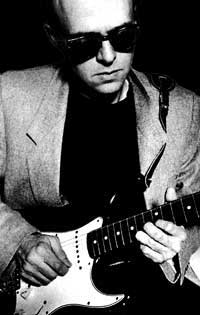Robert Quine remembered

by Steve Caratzas
I met Robert Quine only once, but it was an unforgettable day.I had won a 1978 Fender Telecaster he and his friend Michael Carlucci put up for auction on eBay. This guitar bears the distinction of being the only instrument Quine used to add his licks to albums by both Lou Reed and Richard Hell. I later learned that Robert was a bit crestfallen that the guitar didnít fetch a super huge bid, though it pretty much broke my bank.
Upon the conclusion of the auction, Michael emailed to ask where he should ship the instrument. Living in New York, I asked if it would be okay to just swing by Michaelís store, Subterranean Records, and pick the guitar up Ė and was there any chance that Robert Quine himself might be available to make the handoff?
To my amazement came the reply: "I think he would be flattered."
I arrived early on the appointed day and tried to blend in, which if youíve ever been to Subterranean, isnít an easy thing to do. Small and cramped, the shop is crowded with an astonishing collection of hard-to-find vinyl record albums, posters, memorabilia, and ephemera. I attempted to pretend to be browsing for a bit when down the stairs came the familiar bald-pated, wayfarer-wearing presence of Robert Quine.
I somehow summoned the courage to approach my guitar hero, offering him a sweating palm to shake. He smiled behind his shades as we shook hands.
What followed was basically an hour or so of me playing the part of enthused, gushing fan while Robert politely listened and offered his insights on the various disorganized ramblings I spewed forth. He told some great stories about Lou Reedís Live in Italy album, his work on Ikue Moriís Painted Desert, and Corin Curschellasí Valdun. He mentioned his short tenure in the band Deadline, with Fred Maher (playing guitar), Michael Beinhorn, and Bill Laswell (I believe). He offered advice on various guitar gadgets, still praising the Electro-Harmonix Memory Man as his favorite echo device.
One thread that connected many of the stories was Robertís strong appreciation for detail and perfection. He always thought a certain recording could have been a little better or mixed differently; a performance could have been stronger. He was clearly someone who always wanted to be getting better in his playing, which he wanted to have captured in the best possible way.
When I noted that his archival knowledge of vintage instruments and amplifiers and his encyclopedic understanding of rock and roll should be preserved somewhere, perhaps on a web site, he dismissed the idea outright. I later learned that he didnít have his own email account, and was vaguely computer-phobic.
With Michael Carlucciís encouragement, I went ahead and built a web archive of his career anyway. Using interviews from guitar magazines, various other online resources, and with bits and pieces of information Michael supplied, I was able to cobble together a place where Robertís career can be appreciated and remembered. I was thrilled when Robert agreed to participate in its development, answering fansí questions, and sending along additional recording credits from time to time.
Even more thrilling is to hear his friends tell me how much he liked the web site, and how thankful he was that I took it on as a project. It was a labor of love from the outset, and Ė truth be told Ė the first web site I ever made. It will always be a work in progress.
Robert Quineís music has had such an incredible impact on me. Iím glad I was able to give something back to him.